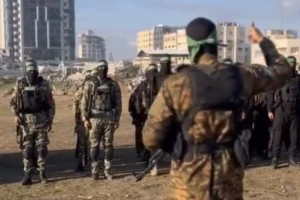600 days of war: Has Israel won, lost – or is the ending still unwritten?

On Wednesday, May 28, Israel marks 600 days of war – the longest war the country has fought since its founding.
The question of whether Israel is winning this war must be asked, but the answer is far from simple. As former MK Mossi Raz told ALL ISRAEL NEWS, "In war, two sides lose".
“We lost a lot of things,” he said. “Probably, the other side lost more. But that does not help me.”
The truth is, we won’t know who – if anyone – won this war until it ends and how it ends.
Israel suffered a devastating blow on October 7, when Hamas and other Palestinian terrorists and civilians from Gaza infiltrated the country, murdered more than 1,200 people, and abducted 251 others. On that day, the public’s faith in Israel’s security establishment and government collapsed. And today, with 58 hostages still held in Gaza, many feel the losses are ongoing.
Yet, Israel is also scoring wins. After speaking with military and strategy experts, ALL ISRAEL NEWS found that the punchline is clear: after 600 days, this war cannot be measured in absolutes. The reality of winning or losing is far more nuanced.
At the start of the war, Prime Minister Benjamin Netanyahu laid out three key objectives for Israel’s response: “Eliminating Hamas, returning all of our hostages, and ensuring that Gaza will never again go back to being a threat to the State of Israel.”
While additional goals have emerged over the past 600 days, these three remain central to the ongoing military campaign.
Hamas’s military infrastructure: Damaged or destroyed
The IDF has succeeded in delivering a significant blow to Hamas, destroying much of its weapons arsenal and eliminating many of its top commanders. Military experts note that although Hamas has managed to recruit new terrorists, the experienced operatives – most of those who underwent military training before the war and carried out the October 7 massacre – have either been killed or captured.
In addition, most of Hamas’ military infrastructure has been seriously damaged or destroyed. From 2007, when Hamas seized control of the Gaza Strip, until the current war, the group has launched more than 27,000 rockets at Israel. But since around December 2023, rocket fire has been sporadic at best.
Reports vary on the extent of the IDF’s success in demolishing Hamas’ tunnel system, but all sources agree that hundreds of kilometers of underground infrastructure have been destroyed.
“We have, to a great extent, achieved our military goals,” Lt.-Col. (res.) Maurice Hirsch of the Jerusalem Center for Security and Foreign Affairs said. However, he admitted the job was not done.
“No one said that within 600 days we would accomplish everything,” Brig.-Gen. (res.) Yossi Kuperwasser, head of the Jerusalem Institute for Strategy and Security, told ALL ISRAEL NEWS.
He explained that from the outset, it should have been clear that this would be a long war.
“It is very difficult to put time limits on a war like this,” Kuperwasser stressed. “It is not easy to achieve our goals. It takes time. This war is a work in progress.”
Kuperwasser, who served as Central Command’s Intelligence Officer between 1998 and 2001 during the early stages of the Second Intifada, recalled telling his colleagues that the intifada would last five or six years. They laughed at the time – but in the end, it took that long to quell the violence.
“No, we are not winning enough yet. We all want to see the hostages released yesterday. We want to see Hamas destroyed yesterday,” Kuperwasser said. “I am not saying this [war] is going to take six years, but we have to be more patient than the enemy.”
He and other experts noted that for much of the war – more than 400 days – Israel’s military hands were effectively tied. Part of that, Kuperwasser implied, was due to political pressure from the Biden administration. But internal resistance also played a role, stemming from military leaders and generals who either did not believe Hamas could be defeated or were unwilling to accept that a sustained military presence in Gaza would be required to ensure terrorists didn’t return after the IDF cleared an area.
Now, however, Israel appears to be taking the necessary steps to finish the job, according to Hirsch.
“It could have been done earlier, faster – we probably did not need 600 days,” he said. “But now we are taking the needed action.”
On the other hand, Hirsch said, Israel has been ineffective in removing Hamas from civilian rule and in reducing its popularity among the Gaza population and the world. Part of this, he argued, was due to the Biden administration’s insistence on sending aid into Gaza, which fell into the hands of Hamas and allowed the group to continue governing the Strip – including through its social service organizations, such as the Hamas-run Health Ministry.
On Sunday, NGO Monitor released a report showing that United Kingdom government documents reveal that “Foreign Commonwealth and Development Office (FCDO) officials were aware of Hamas involvement and the significant diversion risks in Gaza cash-assistance programs.” Yet, the FCDO still provided millions of pounds in funding for projects in the Strip.
“British diplomats, aware that Hamas was likely dictating the disbursement of UK taxpayer funds and also that NGOs linked to other terrorist groups would receive them, identified this as merely a ‘reputational’ risk that might reflect poorly on the UK, not a national-security, legal, or terror-financing concern,” NGO Monitor wrote. “British officials appear more concerned about the UK’s image than about the dangerous implications of lax counter-terror financing policy.”
The fact that any governments are still willing to engage with and fund Hamas shows that Israel has yet to secure victory on this front, Hirsch said.
For the first time since the start of the war, a U.S.-backed aid group, the Gaza Humanitarian Foundation, is distributing aid in the Strip while keeping it out of Hamas’ hands. It took Israel and the United States this long to circumvent Hamas – and this delay, critics say, was far too long.
One hostage in Gaza is one too many
The inability to return all of the kidnapped hostages has perhaps been the biggest stain of the last 600 days.
Some have argued that Israel should have immediately signed a ceasefire and gotten the hostages out of Gaza even before launching the ground offensive. Others say Israel should end the war now and bring them home at any cost. But few dispute that getting these people home should be among the highest priorities of the government and the military.
Society cannot heal until they are back in Israel – the dead and the living.
As Judaism teaches, every person is a world, and if even one hostage remains in Gaza, that is one too many.
However, this goal has been partially accomplished, and that should be recognized. Around 80% of the hostages have been returned to Israel, either through military rescues, hostage deals, or covert or overt international pressure.
Moreover, it is likely unrealistic to believe that Hamas will simply release the hostages, even if Israel agrees to end the war.
“Despite disinformation and false messiahs, there is no way Hamas will release all the hostages through a diplomatic process,” Hirsch said. “We need the military to push to release all the hostages. Without it, we will be left with hostages in Gaza for eternity.”
Other battlefronts have been hit even harder
Outside of the military campaign conducted in the Gaza Strip, one must also remember that Israel has been fighting a seven-front war, including against the head of the proxy web: Iran.
On many of these fronts, Israel has achieved noteworthy success. For example, Hezbollah has been severely hit, and Israel is now working closely with Lebanon to maintain the ceasefire and cut Iranian ties with the country.
U.S. President Donald Trump is pushing Syria to consider cooperating with Israel and perhaps even to join the Abraham Accords.
Meanwhile, the devastation inflicted on Iran has also been significant. Israel took out the majority of Iran’s air defense forces in two retaliatory strikes last year, and security experts have said that Iran is now largely unprotected should Israel choose to attack its nuclear facilities.
Many mistakes have been made on what’s often referred to as the eighth front: the battle for public opinion. Here, Israel undoubtedly could have done better.
Throughout the war, the country has lacked a strong spokesperson’s office – one that provides consistent messaging and is staffed with the right people to respond rapidly and effectively to antisemitic or even false reports about Israel on the social networks or in the media.
Foreign journalists regularly complain not only about the lack of access to information in English but also about being unable to enter the Gaza Strip, which they say prevents them from reporting more accurately on what is happening on the ground. The Foreign Press Association has petitioned the courts to lift the entry ban for journalists into Gaza; however, a hearing on the petition has been continually delayed.
Meanwhile, Gaza-based bloggers and stringers continue to disseminate negative information from inside the Strip through an internet connection that Israel has not cut off from Hamas – even after 600 days of war.
Raz also told ALL ISRAEL NEWS that he fears Israel has lost some of its moral compass in that it fails to recognize that while the war against Hamas may be just, revenge is not a strategy – and the death of innocent civilians on either side is a tragedy.
He highlighted that Israeli media often covers only one side of the story, ignoring the thousands of children who have been killed in the Gaza Strip as the IDF fights one of the most complex urban warfare battles in modern history. Even if the IDF is doing its best not to kill civilians, they are dying – and no one should be happy about that or choose to ignore it.
“The majority of Israelis don’t care about the suffering on the other side, which is terrible,” Raz said. “We lost our moral values.”
Still no verdict
On the other hand, domestically, we have witnessed an outpouring of unity and solidarity with each other and the country.
Whether one agrees or disagrees with the hostage families’ protests, thousands of Israelis have stood together in a powerful call for their release – for all 600 days of this war.
Despite the hardships faced by reservist families – and more and more studies are being published about this – the majority continue to show up, fight for Israel, and believe that whether Israel has already won or is still in the process of winning, ultimately, the Jewish state will prevail. They are willing to die fighting for that victory.
Six hundred days of war is 600 too many. And yet even after all this time, the verdict remains unclear: Has Israel won, or has it lost?
Hopefully, it won’t take another 600 days to find out.
.jpg)
Maayan Hoffman is a veteran American-Israeli journalist. She is the Executive Editor of ILTV News and formerly served as News Editor and Deputy CEO of The Jerusalem Post, where she launched the paper’s Christian World portal. She is also a correspondent for The Media Line and host of the Hadassah on Call podcast.
You might also like to read this:









